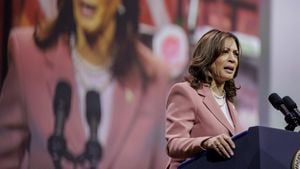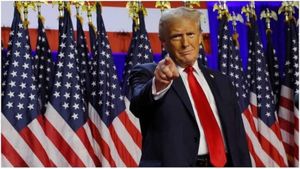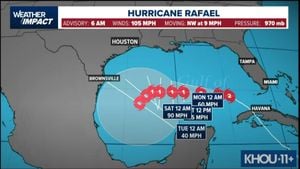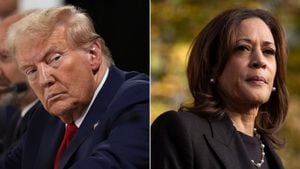Donald Trump's recent re-election as President of the United States has sent shockwaves through the political corridors of Tehran. Following years of fluctuated tensions, uncertainty now looms as the Iranian regime braces for renewed pressure both domestically and internationally.
During his previous term, Trump adopted what many labeled as his "maximum pressure" strategy against Iran, which severely restricted the nation’s economic avenues and caused immense financial strain. His administration's approach included withdrawing from the 2015 nuclear deal and imposing stringent sanctions, actions which have not been forgotten by Iranian leaders, eager to avoid the pitfalls of his hardline policies.
Despite the apparent apprehension, Iranian officials initially responded with public indifference about Trump’s victory, claiming it wouldn't alter U.S. policies or approach to the region. Iranian President Masoud Pezeshkian suggested, "It makes no difference to us who won the US election," emphasizing instead their focus on strengthening relations with Islamic nations.
Yet, this stance may be mere bravado, as Trump's re-election conjures memories of past aggressions. Analysts within the Iranian political sphere are decidedly less optimistic. Ahmad Zeidabadi, a prominent Iranian commentator, expressed on social media the challenges Trump's foreign policy may present, particularly if previous international hardliners return to power. He stated, "Enduring another term with a narcissistic, deceitful, and unpredictable leader... is severe punishment."
The backdrop for these sentiments is the recent volatility across the Middle East, particularly the escalation of the Israel-Hamas conflict. The unrest sparked by Hamas's unprecedented attack on Israel has left many Iranian analysts contemplating the potential ripple effects moving forward. John Ghazvinian, who has deeply studied US-Iran relations, noted how Iran traditionally adopts a wait-and-see approach when it concerns new U.S. administrations, but the stakes have never been so high.
A new Trump administration could lead to aggressive sanctions aimed at crippling Iranian oil revenues, already diminished from years of existing sanctions. Sadegh al-Hosseini, another Iranian political observer, highlighted the urgency for internal reform within Iran’s governance, reflecting on wasted opportunities during President Biden's tenure.
While some Iranian officials maintain optimism about potential dialogue or moderate policies, historical patterns from Trump's initial term suggest otherwise. Remember, during his first stint, his policies didn't just isolate Iran; they also catalyzed fears of military confrontation, particularly as Israel ramped up its actions against Iranian interests across the region.
The potential for conflict is heightened as Israeli Prime Minister Benjamin Netanyahu and Trump quickly discussed Iran’s influence shortly after the election, signaling readiness for joint strategies. Whether through military escalation or economic warfare, the strategies employed could pit not only the two nations against each other but embroil much of the region's precarious relationships.
Tehran's dual approach of publicly dismissing worries about U.S. politics and privately nurturing fears of renewed aggression encapsulates their dilemma. The Iranian regime, steeped in the need for stability, finds itself treading cautiously along the precipice of conflict. Judging from the visceral reactions and public outcries within Iran, the potential for civil upheaval looms equally large. Many view Trump's return as not just another phase of American politics, but as yet another challenge to their sovereignty and survival.
On the ground, Iranians face domestic crises exacerbated by sanctions and governance failures. Economic hardships, increasingly visible through widespread poverty and lack of infrastructure, have catalyzed widespread dissatisfaction among the populace. With growing concerns over human rights abuses and state repression, many are pushing for significant change alongside holding the government accountable.
The UN's recent reports on human rights violations resonate with the sentiments of many Iranians who feel trapped not only by foreign pressures but also by internal governance failures. This struggle for basic rights and economic stability is set against the fragile backdrop of regional politics and international diplomacy.
Iran analysts warn of the rising stakes of conflict, particularly as Israel maintains its aggressive posture amid increasing tensions. Any misstep could ignite fears of war, reflecting deeply the anxieties faced by the Iranian leadership. "The general policies of the United States and the Islamic Republic of Iran are fixed," said Fatemeh Mohajerani, government spokesperson, hinting at the entrenched hostilities persisting regardless of leadership on either side.
With sweeping changes on the horizon, the Iranian regime faces the impending reality of Trump's presidency, which many of its leaders characterize as significantly threatening. Acknowledging the past wrongs of American policies, Iranian leaders are also wrestling with internal dissent, making it unclear whether they can project stability both at home and abroad.
For many observers and citizens, life under another Trump presidency means adopting both vigilance and resilience. Iran's leadership is left to navigate tumultuous waters, trying to recalibrate their strategies as they await to see how contests between old foes play out against the backdrop of long-held rivalries and aspirations within the chaotic Middle Eastern theater.
The real question now is: can the Iranian regime withstand external pressures from the United States under Trump's renewed administration, alongside the palpable demands for reform and change from its own people? Only time will tell as the region braces for what could be another era of unprecedented political volatility.



